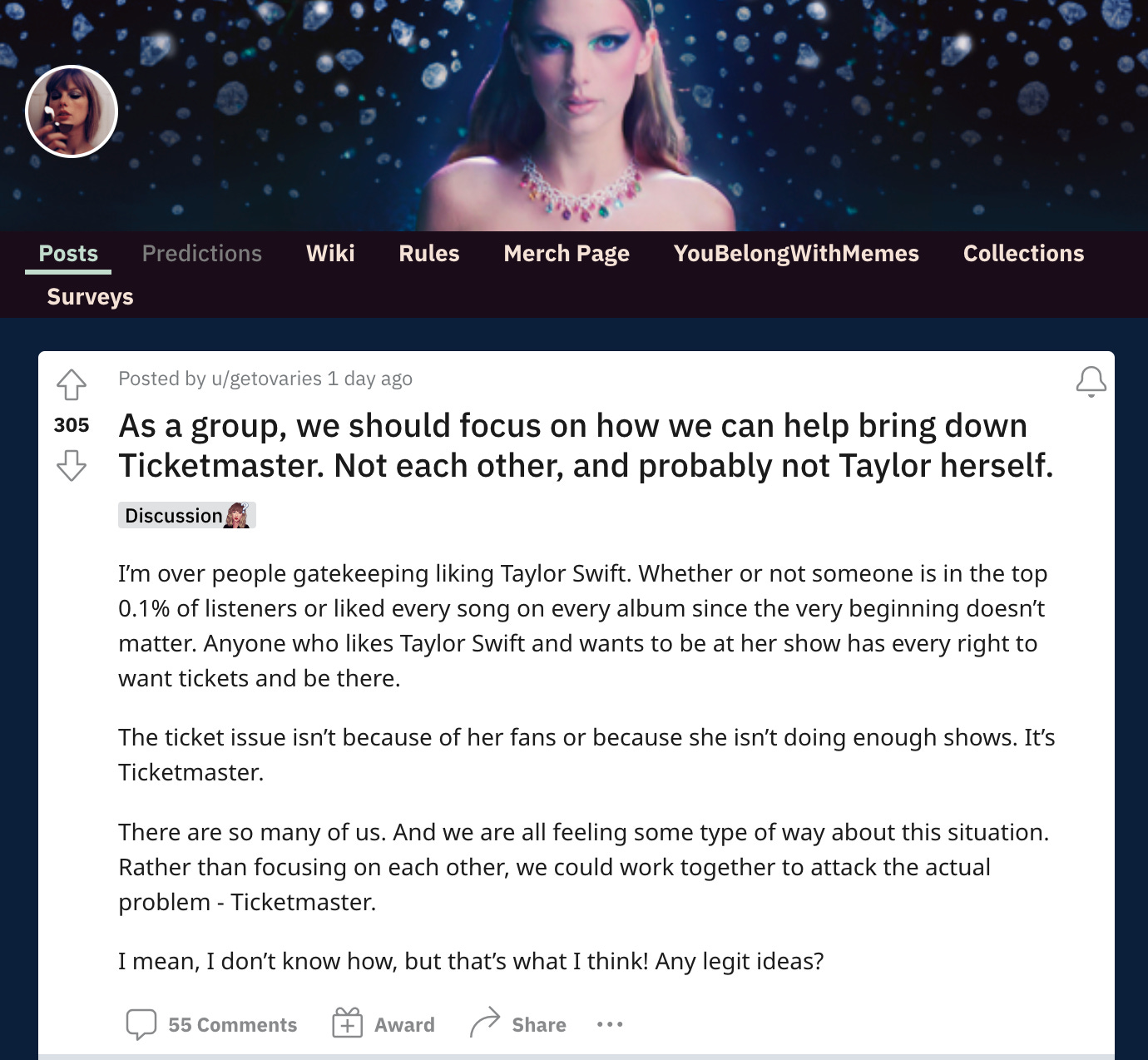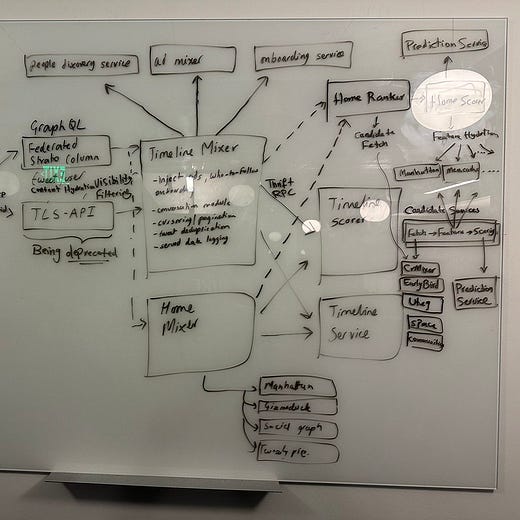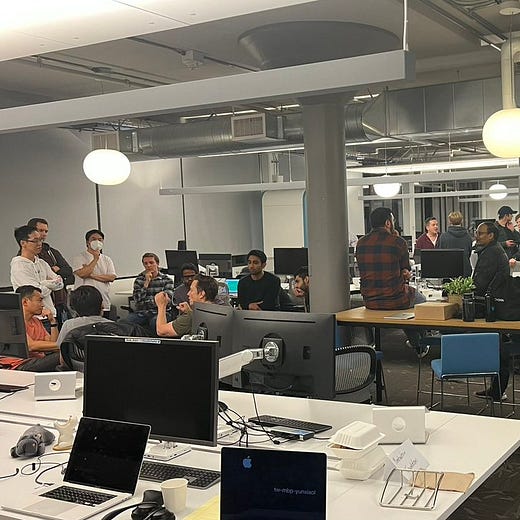All the 👏🏼 👏🏾 👏🏿 you need for those Thanksgiving crypto conversations
+ Swifties acquire 'class consciousness' and become a formidable bloc. And how we can heed warnings from sci-fi, but still adapt the technology they inspire.
1/ How to Explain What’s Going on at FTX to the Relatives You Told About Crypto Last Year
There’s never a dull moment in the world of crypto and web3. But rarely does it explode onto the mainstage like it has over the last few weeks. If you’ve been living under a rock, you can catch up on the FTX drama here. Probably a good idea as it’s happening just in time to be a main topic of discussion at Thanksgiving.
Last year, the big topic was the boom in crypto and NFTs. The price of ETH was over $4,400, BTC was over $58,000 and NFTs were flying off OpenSea’s shelves (on the way to $14B in volume for the year). One year later, those that spent the meal telling their relatives about the crypto revolution will be faced with a different set of questions and a different tone. Plug ‘crypto thanksgiving’ into Twitter (speaking of spicy Thanksgiving topics) and you’ll quickly see what I mean ☝🏼
Here’s the FTX TLDR. One of the largest crypto exchanges imploded in a spectacular fashion — costing VC, retail investors, and regular investors billions of dollars and capturing the attention of the mainstream for all the wrong reasons. It’s founder/CEO, crypto’s ‘Golden Boy’ Sam Bankman-Fried (SBF) was revealed to have not only no clothes, but a rather cynical view of the US regulatory system (and of humanity in general:).

Conspiracy theories and hot takes abound around what is being dubbed the worst fraud since Enron or Bernie Madoff with a flash crash comparable to the Lehman Brothers debacle that served as the kickoff to the 2008 Financial Crisis. For those under the scrutiny of their relatives at the dinner table on Thursday, this comparison to traditional finance is an important nuance. Because that’s really what this is: typical finance fuckery.
After prior crypto industry blow-ups (ie. the Mount Gox hack), crypto critics are generally out in full force at their loudest. Charged up on self-righteous validation (and maybe some schadenfreude). But after the FTX disaster, many of those traditional critics are now singing a different tune. There seems to be a new recognition that a centralized exchange (dealing in crypto) is not the same as a blockchain-based currency. In other words, this is just growing pains for an industry gaining mainstream legitimacy.
On the heels of the FTX meltdown, JP Morgan crypto analysts made a point to clarify that this crash (and those preceding it) were actually caused by centralized entities.
“Moreover, while the news of the collapse of FTX is empowering crypto skeptics, we would point out that all of the recent collapses in the crypto ecosystem have been from centralized players and not from decentralized protocols.”
They go further to suggest that this event may be a net benefit for institutional adoption of crypto assuming swift (and obviously needed) regulation is a consequence of the FTX disaster. JP Morgan Chase boss (and staunch crypto critic) Jamie Dimon, maintains that crypto is “worthless” (despite having a team dedicated to it on the payroll). (But ofc he does…he has a vested interest in maintaining the status quo).
The fact is, for those that don’t work directly in the web3 space, crypto is still just a speculative asset (one that has not fared well in the latest economic downturn). And SBF is the latest in a series of fraudsters selling snake oil that define the industry. It’s not a good look, but the finance industry isn’t exactly populated by people known for progressive ideals, innovation, and altruism).
But the change in sentiment from traditional finance industry experts like the JPMorgan Chase analysts tells another story. Their view that the FTX debacle is not an indictment on the fundamental technology or philosophy behind crypto, but a failure to properly use it (and more likely outright criminal activity) is a relatively new one.
Our largest financial institutions such as Bank of America and Fidelity (in addition to JPMorgan) seem to be taking a “if you can’t beat ‘em, join ‘em” approach — and are now adopting the technology rather than battling it. Meaning regulation is slowly but surely coming.
In one of spaces darkest hours, there is a glimmer of light at the end of the tunnel. Though you may want to hold on telling your relatives to ‘buy the dip’ (😂). You can just tell them to wait for the inevitable movie:
2/ Ticketmaster May Have Met it’s Match: 3.5B Angry Swifties
And now for some good news…BTS Army vs. QAnon. The #FreeBritney movement vs. conservatorship law. Pussy Riot vs. Putin. Whether it’s sinking a Trump Rally from afar, challenging California legislation, or generating $7.1M for relief efforts with UkraineDAO, by now, corporations, lawmakers, and other untrustworthy brokers should know better than to poke the bear that is Internet Fan Outrage.
The powers-that-be may want to write these movements off as conspiracy-theorist-herd-mentality, but it’s hard not to see this as a form of well-earned vigilante justice. A much-needed sliver of hope for what feels like the darkest days of the Internet. The revolution may not be televised, but it will be Tweeted (at least for now).
As we learn to live with the pandemic, millions of Americans have been excited to get back out there and check out the concerts, games, and stand-up sets they’ve been missing over the last 2.5 years. Only to be met with sticker shock at the cost of tickets.
Yes, the face value of these tickets has gone up considerably. But an even bigger problem is the get-out-of-jail-free-card free $$$ bucket labeled: transaction "fees," which can run up to "as high as 75% of the ticket price." Worse still are all of those who are increasingly being forced to buy tickets on the secondary market, where prices and fees are even higher.
Usually, the villain is a little harder to pinpoint. Not so in this case. The blame for this can all be laid at the feet of one company: Live Nation Entertainment. Judd Legum of Popular Information has a great breakdown of how Ticketmaster continues to get away with their PacMan-like appetite for getting a bigger and bigger piece of the proverbial pie.

“An already dominant market player merging with its only real competitor would seem like a red flag for antitrust officials. And there were other concerns. Specifically, the merged company could use Live Nation's relationship with hundreds of popular acts, from Miley Cyrus to U2, to pressure venues to use Ticketmaster's services.”
Just so you understand just how truly incestuous it all is:
“Live Nation Entertainment issues tickets (Ticketmaster), manages venues (Live Nation), and represents performers (Live Nation). Ticketmaster has retained more than 80% of the primary ticket market and jacked up fees. On its website, Ticketmaster emphasizes that its ticketing fees are split with "clients," which include the venues and promoters. But Ticketmaster's "clients" are often other entities owned by Live Nation Entertainment.”
Well, last week, Ticketmaster may have finally met its match when the much-hyped drop of TSwift’s Eras tour was riddled with bugs and overwhelming demand.
“Make no mistake: Ticketmaster deserves the scorn that it is currently receiving from Taylor Swift’s listenership, a population of such size and power that it probably merits a spot in the United Nations…the fiasco appears to present a tidy parable about what happens to institutional competence when a company holds what many lawmakers allege to be monopolistic power for more than a decade.”
— The Atlantic, How Taylor Swift Broke Ticketmaster
In other words, Ticketmaster got complacent after it got too big for its britches, and now it’s invoked the wrath of the Swifties and millions of Internet onlookers. 🍿
More and more, it’s on us as a collective to demand accountability from the capitalist institutions that would otherwise be content to just continue to pass the Monopoly $$$ back and forth between one another. (Just see the creator outcry when NFT marketplaces tried to move away from requiring traders to pay creator royalties.)
If Ticketmaster’s not scared, they’re even more out of touch than we thought.
3. More Human Than Human: How Design-Thinking is Helping Us Adapt Sci Fi Concepts into Useful IRL Tools
Black Mirror episodes are meant to be cautionary tales about the creeping effects of technology on society. And how technology for technology’s sake, without a second thought, can lead to some truly dystopian outcomes. It was not meant to be a playbook for us to follow…although some don’t seem to have gotten the memo.
All the way back in December 2011, Black Mirror’s first season featured an episode called The Entire History of You that featured a technology that allowed you to relive your memories ‘verbatim.’ Imagine: a blow-by-blow replay of everything you heard and saw on any given day.
Just over 10 years later, that technology is now on its way. Though as is the case with many sci-fi predictions — not in the exact form we expected it to, but with all the same potential for dystopian use cases.
Rewind.ai adds a new dimension to your computing experience: time. (So far, so good, right? Are you intrigued?) On top of that, add the ability to search: “anything you’ve seen, said, or heard.” (Hmmm…this is where the 🚩🚩🚩 start popping up).
It’s not hard to imagine the positive ways this technology could impact society. It’s definitely a worthwhile path to explore (never take notes during a meeting again, where did I see that new cafe I wanted to check out?). But there’s also a million implications that need to be thought through up-front. (Like for example, did your co-worker agree to have his dumb jokes immortalized forever in your mind palace? Probably not.)
“Possibly the only way to create a life-logging service like this is at the platform level. If Apple built a Rewind-like app into the Mac, you might be more likely to trust it. After all, you already trust the operating system with all your passwords, meetings, and after-lunch video-watching habits. But given the privacy concerns, it seems unlikely that Apple would go anywhere near such an idea.
This is a shame because Rewind looks well-designed and incredibly useful. The good thing is it’s available now (invite-only currently), so you can decide for yourself whether the tradeoffs are worth it.”
— Charlie Sorrel, Lifewire.
Luckily, in this case, they are taking feedback.
The advancement of technology as a virtue has generally served us well. We’re all glad to have electricity, running water, the ability to get from A to B without having to go on foot or by pack animal, after all. Even the Internet is a net positive — 4-Chan and doom-scrolling aside — because it opened up the wealth of the world’s knowledge to anyone with a dial-up connection. And gave all of us a platform for our voices to be heard.
But the pace of technological advancement is quickening, and if there’s anything the last 3 years have taught us, innovation for the sake of innovation is not always the answer. See: exhibit A, Amazon’s workforce organizing against the automation of everything. Exhibit B. Uber/ Lyft starting to charge riders more because they aren’t willing to pay their drivers enough. Or Exhibit C, Netflix suddenly including ads and becoming…just another cable company?
All these start-ups were built on one metric: subscriber growth. And now that growth is slowing, as it necessarily must (we’d need to get to procreating to ensure there’s more model Prime members), they are all reverting back to the old systems they were set up to “disrupt.”
If we don’t want to live in a Black Mirror episode, we need to take a more human approach to innovation by reminding ourselves: what do people actually want? Convenience is not the answer to everything. In fact, it often comes with unintended side effects that leave us more disconnected, anxious, and paranoid. Think about the last time you flipped out because your UberEats order didn’t get to you fast enough. Is it fair to blame the delivery guy? The restaurant?

If we’re going to do better than all those sci-fi cautionary tales, we need to all be a little bit more self-aware. To not innovate for the sake of innovation or leave it all up to the engineers. If the Rewind.ai story teaches us anything, it’s that it’s us — the end-users — who have to speak up and give feedback where we can, so that our future can be more human than our past.
One silver lining case study: teams at The Feminist Internet, a nonprofit founded to challenge the conventions of experience design, are working to find a less sexist solution to the established norm of “coy, submissive" AI interfaces — ie. Rosie the Robot, Microsoft’s Cortana, Amazon’s Alexa, Apple’s Siri.
“In response to the troubling feminisation of voice assistants in the mainstream, there’s a growing number of designers in the digital realm working on projects that bring a more nuanced approach to the topic of gender and voice technology. What these projects have in common is an attempt to expand the notion of what our future could look, or rather, sound like, away from some vision of sexy cyborgs voiced by Scarlett Johansson, into more imaginative territory, where a digital voice might come to act more like a companion.”
— Madeleine Morley, Eye on Design
Your AI doesn’t need to coddle you. It’s not your mommy. What gives us hope is that it took a team of researchers, designers, and engineers together to demand better and offer up an alternative solution.
As we seek to define what future we all want to collectively live in, it’s important to remember how valuable this kind of cross-discipline collaboration is so that we’re not blindly chasing technology and dealing with whatever outcomes may come.
Otherwise, we’ll be leaving it up to these guys to save us all:
…And In Case You Missed It
Bob (Robert Allen) Iger returns to Disney —replacing Bob (Robert Alan) Chapek…yes, really. Diversity in action.
Azuki partners with Red Bull Racing to feature NFTs on vehicles
Nike launches .swoosh virtual goods platform and marketplace
Adidas reveals phase 2 of ‘Into the Metaverse’ collection (virtual fashion line)













